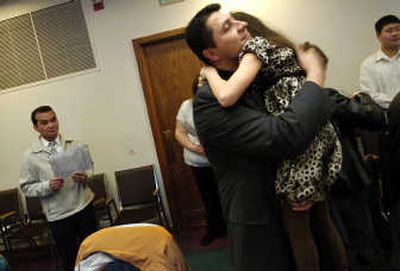Pasco principal becomes U.S. citizen

As boys growing up in central Washington, George Mendoza and his brothers didn’t realize they were not U.S. citizens until one day their father did not come home from work.
“Dad told us we were born in Madera, California,” Mendoza said. “He never told us it was not true.”
When Mendoza was in third or fourth grade, his father, Jesús Mendoza, was deported to his native Mexico. Desperate to provide a future for his family, he returned to Washington, where he continued to work in the state’s orchards and fields. In 1986, the Mendozas received amnesty under the Immigration Reform and Control Act.
On Tuesday, George Mendoza, 34, principal at Virgie Robinson Elementary School in Pasco, became a U.S. citizen along with 47 other immigrants at a naturalization ceremony in Spokane.
Mendoza joins other members of his family who have already become U.S. citizens, including his father and brother, Ren, who has served in Iraq with the U.S. Army.
Mendoza, whose earliest memories are of working in orchards, attended Prosser High School and received his degree in education from Eastern Oregon University.
After teaching for a few years, he obtained his master’s degree in education leadership at Northwest Nazarene University and became vice principal at Ontario Middle School in Oregon.
When Virgie Robinson Elementary opened three years ago in east Pasco, Mendoza became its principal.
“The prospect of opening up a new elementary school in Pasco was extremely appealing,” he said. “Combined with reuniting with loved ones, it was too good to pass up.”
An earlier attempt to become a citizen was thwarted, he said, when his application was sent back to him because of an error. The required fingerprints were unreadable.
But each year, Mendoza said, the desire to become a citizen grew stronger.
On Tuesday, his wife, Kristi, and their three children watched as he took the Oath of Citizenship administered by federal Magistrate Judge Cynthia Imbrogno.
Mendoza is not unaware that immigration reform has become the subject of heated debate as the nation prepares to elect a new president. He believes a path to citizenship is a moral and practical alternative to “needless disenfranchisement,” particularly with regard to children brought into this country illegally through no fault of their own.
“Amnesty has allowed me to stay in this country, to be educated and give back to society,” Mendoza said. “Today, there are a lot of people in the same situation.”
As principal of a new grade school that is 96 percent Latino, Mendoza said, he feels a connection to his students.
“I was in their shoes when I was their age,” he said, adding that the investment in their education will one day pay off as well.
“We are investing in their dreams,” Mendoza said. “A lot of time, energy and money have been spent creating healthy, viable adults. It would not be smart not to find ways for them to contribute and be successful.”